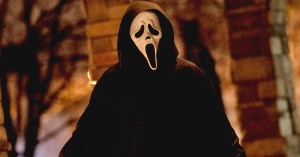Total Recall: Memorable Movie Stalkers
With The Roommate hitting theaters, we present a brief rundown of obsessive sociopaths in the movies.
Humans are social creatures, but we also need our privacy, and having it invaded is one of the more unpleasant things a person can be forced to deal with. Ironically, we sort of seem to love watching other people go through it — just ask Hollywood, where stalker movies have been raking in the dough for decades. This weekend brings us another entry in the genre: The Roommate, starring Leighton Meester as a college co-ed who develops a psychotic obsession with Minka Kelly, and it got us thinking about previous stalkers on the silver screen. From bunny boilers to former rappers, this week’s list has something for everyone who enjoys watching someone’s life infiltrated by a crazy person. It’s time for Total Recall!
The Cable Guy
57%Over the last 30 years or so, Americans have slowly lost their faith in face-to-face connections, bringing us to the point where something as small as letting a cable installer into your home can seem like a recklessly dangerous act — because you just never know when he’s going to turn out to be a rictus-grinned lunatic like the one Jim Carrey played in The Cable Guy. Getting the premium channels for free is nice and everything, but is it worth being stalked by a guy who’ll get you arrested, fired from your job, and kidnap your girlfriend? Most critics thought it was safer just to skip The Cable Guy completely, but it had its defenders — including Jonathan Rosenbaum of the Chicago Reader, who wrote, “It’s a fairly interesting effort — much more ambitious than most Carrey vehicles.”
Cape Fear
88%To a generation of filmgoers, Cape Fear will always be that one kinda creepy Scorsese picture with De Niro and Nick Nolte — but as fine as the remake is, everyone really needs to see the seething 1962 original, which pits the ever-decent Gregory Peck against a skin-crawlingly brilliant Robert Mitchum. Peck plays the committed family man and contributing citizen; Mitchum plays the skeevy rapist who blames Peck for the eight years he spent in prison; the audience can’t turn away until the inexorably violent conclusion. Bosley Crowther of the New York Times wanted to dislike Cape Fear, but couldn’t: “Menace quivers in the picture like a sneaky electrical charge. And Mr. Mitchum plays the villain with the cheekiest, wickedest arrogance and the most relentless aura of sadism that he has ever managed to generate,” he wrote, following with the disclaimer “But this is really one of those shockers that provokes disgust and regret.”
The Crush
28%Critics loathed The Crush (James Berardinelli joined the chorus of disapproval with his review, pointing out that “The story not only relies on the complete and unalterable stupidity of every character in the movie, but on the gullibility of those who watch it”), but audiences weren’t so quick to judge — particularly on home video, where this gleefully cheesy tale of a young magazine writer (Cary Elwes) and the unbalanced 14-year-old (Alicia Silverstone) who pursues him at all costs found its audience. Silverstone picked up a couple of MTV Movie Awards for her performance, and from there it was off to Aerosmith videos and Clueless fame (as well as Batman & Robin, but let’s not talk about that right now).
The Fan
38%Thirteen years after he played a schlubby stalker in The King of Comedy, Robert De Niro did it again — with admittedly diminished critical results — for 1996’s The Fan. De Niro stars here as Gil Renard, a down-on-his-luck knife salesman whose irrational love of baseball morphs into an obsession with Bobby Rayburn (Wesley Snipes), an outfielder recently traded to Gil’s beloved San Francisco Giants. One thing leads to another, and a few absurd plot twists later, director Tony Scott gave audiences the inevitable home plate showdown. Critics mostly booed, but a few writers thought The Fan was a home run, including Frederic and Mary Ann Brussat of Spirituality and Practice, who called it a “mesmerizing film about the soul-killing dimensions of perfectionism.”
Fear
47%Between his early 1990s chart-topping run as the boxer-flashing rapper Marky Mark and the award-winning string of films that started with 1997’s Boogie Nights, Mark Wahlberg was just another struggling actor, albeit one whose brother was the angriest member of the New Kids on the Block. It was during this period that Wahlberg starred in Fear, a suburban dad’s nightmare about a psychotic punk who latches on to a naïve teenager (Reese Witherspoon) and then, when she breaks up with him, enlists his friends to take revenge on her entire family (including the dog). A minor breakout success for its two young stars, Fear earned Wahlberg an MTV Movie Award nomination for Best Villain, although most critics didn’t think much of it. Clint Morris offered a minority opinion for Film Threat, calling it “Corny but cool” and adding, “Wahlberg has presence.”
Fatal Attraction
74%Hey, she warned him that she wasn’t going to be ignored — and when Dan Gallagher (Michael Douglas) didn’t listen, Alex Forrest (Glenn Close) made good on that promise by attempting suicide, murdering a defenseless bunny, kidnapping his daughter, and eventually attempting a little bathtub foul play. A deranged stalker classic of the 1980s, Fatal Attraction functioned as both a slick thriller and a cautionary morality tale for husbands entertaining the thought of stepping out on their wives — and more importantly, it was good cinema, as argued by critics like the Washington Post’s Hal Hinson, who wrote, “Fatal Attraction has an inescapable pull to it; it’s suffocatingly exciting.”
The Hand That Rocks the Cradle
67%Drive a woman’s husband to suicide — and put her under enough stress in the process that she loses her baby and has to have a hysterectomy — and there’s simply no telling what she’ll do. Case in point: Rebecca De Mornay in The Hand That Rocks the Cradle, 1992’s cheesetastic stalker hit about a grieving widow who poses as a nanny to infiltrate the home of the woman (Annabella Sciorra) who helped expose her obstetrician husband’s proclivity for inappropriate touching. While most critics weren’t particularly impressed with it, Cradle had its defenders, including Jonathan Rosenbaum of the Chicago Reader, who wrote, “Curtis Hanson’s direction and Amanda Silver’s screenplay are both models of no-flab craft and intelligence, and all the actors (who also include Ernie Hudson and Julianne Moore) are believable from the first frame to the last.”
The King of Comedy
89%A miserable failure at the box office during its theatrical run, 1983’s The King of Comedy is nevertheless one of the more prescient films of the decade — not only because of the unflinchingly honest way it deconstructs the relationship between celebrities and their fans, but because of its trenchant observations on celebrity culture in general. Hopeful comedian/psycho stalker Rupert Pupkin (Robert De Niro) is a fairly lamentable human being, but in the reality TV era, his rise to fame doesn’t seem all that unusual — and now that we’ve been conditioned to expect the worst from our matinee idols for decades, the unctuous antics of his obsession (a never-better Jerry Lewis) are all too familiar. “It’s Martin Scorsese’s second least popular movie, after The Last Temptation of Christ,” observed Salon’s Joyce Millman, “which is a shame, because it’s Scorsese’s second greatest film, after Taxi Driver.”
One Hour Photo
81%Having Robin Williams stalk your family may not seem like such a bad time, but the unlucky clan that piqued his interest in One Hour Photo didn’t get the cuddly good-time Robin of Aladdin or Mrs. Doubtfire; no, they picked up a creepy weirdo who covered one of his apartment walls with pictures of them — and decided to take matters into his own hands when he discovered that their real life didn’t live up to the idyllic fantasy he’d painstakingly assembled. “It’s the mark of a good thriller when we never know quite when to relax,” wrote Jim Shelby of the Palo Alto Weekly, adding, “This movie has several witty and visually adept sequences which caught me completely off guard, and has me still thinking about them.”
Play Misty for Me
85%Clint Eastwood’s directorial debut is an all-time stalker classic, about a late-night DJ (Eastwood) whose ill-advised fling with a fan (future Arrested Development matriarch Jessica Walter) has seriously unintended consequences — starting with her repeated calls into his show to request “Misty,” and concluding with some high-stakes stabby action in the final act. “Eastwood displays a vigorous talent for sequences of violence and tension,” wrote Time’s Jay Cocks, adding, “He has obviously seen Psycho and Repulsion more than once, but those are excellent texts and he has learned his lessons passing well.”
Single White Female
53%No surprises here — if any movie belongs on this list, it’s the 1992 hit from which The Roommate seems to have lifted most of its DNA. Starring Bridget Fonda as a software developer who needs a roommate after she tosses her cheating boyfriend (Steven Weber) out on his keister, and Jennifer Jason Leigh as the secretly nutso woman who moves in after answering her ad, Single White Female offered viewers plenty of sex, violence, and ludicrous plot twists — none of which were enough to impress most critics. Rob Thomas of Madison’s Capital Times was among those who enjoyed it, however, admitting, “This should be trash, but Fonda and Leigh’s performances keep things believably chilling.”
Sleeping with the Enemy
24%By February of 1991, Home Alone had been king of the box office for nearly three months — and then along came this nail-biting thriller about an abused wife (Julia Roberts) who meticulously fakes her own death to escape her mustachioed control freak of a husband (Patrick Bergin). Of course, she unwittingly leaves just enough loose ends behind to convince him that she isn’t really dead, thus setting in motion the murderous chain of events that turned Sleeping with the Enemy into a $174 million hit. Critics, however, weren’t as impressed as audiences; while filmgoers were shrieking into their popcorn, Roger Ebert joined his fellow scribes in dissent, saying, “The film begins as an unyielding look at a battered wife, and ends as another one of those thrillers where the villain toys with his victim and the audience.”
Take a look through the rest of our Total Recall archives. And don’t forget to check out the reviews for The Roommate.
Finally, here’s Blondie with a peppy ode to stalking:






